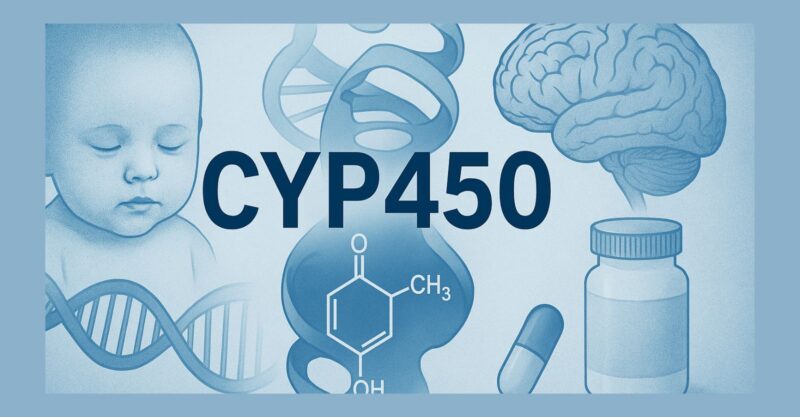CYP450 Enzymes: The Overlooked Link Between SIDS, Autism and Suicide
How immature detoxification systems in infants may connect vaccine exposure, neurodevelopmental injury and later mental health crises
A groundbreaking paper by Gary S. Goldman, PhD, and Eileen Dannemann—“CYP450 Mediated Metabolism: From SIDS to Suicide”—reveals a unifying biological thread connecting Sudden Infant Death Syndrome (SIDS), Shaken Baby Syndrome (SBS), autism spectrum disorders (ASD), neurodevelopmental delays and even later-life outcomes such as suicide and homicide. The link lies within a critical yet under-recognized detoxification system in the human body: the cytochrome P450 (CYP450) enzyme family.
These 57 enzymes, found primarily in the liver, are responsible for metabolizing about 70–80% of all prescription drugs as well as environmental toxins, hormones, and vaccine excipients. Their job is to help neutralize and eliminate these compounds from the body. But in newborns and young children, CYP450 enzyme activity is profoundly immature—functioning at only 30–60% of adult capacity at birth, with some not reaching full maturity until five to ten years of age. This limited detoxification ability leaves infants biologically vulnerable to the buildup of toxins, especially from substances like aluminum, polysorbate 80, mercury and formaldehyde.
Goldman and Dannemann describe the infant liver as a “small, fragile cup with a narrow drain.” Each vaccine or medication dose adds trace amounts of toxic ingredients that the body struggles to clear. One exposure may not overflow the cup, but repeated doses during early life—when detoxification systems are still developing—can lead to a quiet overflow that disrupts immune signaling, hormonal balance, and neural development. By 12 months, most infants have received around 20 vaccine doses, and nearly 30 by age three, precisely when their detox systems are least equipped to handle them.
Adding complexity, genetic variations in CYP450 enzymes determine whether someone is a poor, intermediate or rapid metabolizer of drugs and toxins. The same dose can be harmless for one person yet toxic for another. The authors urge that pharmacogenetic testing—already used in psychiatry—become standard medical practice before administering any vaccine or drug, allowing personalized and safer care based on metabolic capacity.
Even before birth, the CYP450 system in the fetus is nearly inactive. When a pregnant mother takes acetaminophen (Tylenol), her mature liver detoxifies it safely—but her baby’s liver cannot. Combined with low fetal glutathione reserves, this leaves the fetus vulnerable to toxic byproducts. The common medical advice to give Tylenol after vaccines for fever or discomfort adds another burden to an infant’s already taxed detox system.
The paper also challenges traditional views of Shaken Baby Syndrome, suggesting that biochemical fragility—not trauma—may explain some cases of subdural bleeding or fractures. When immature CYP450 enzymes are stressed by exposure to vaccines, antidepressants, or other drugs, oxidative stress increases and blood vessels weaken. These vulnerabilities could produce internal bleeding or bone fragility even without abuse. Evaluating maternal drug use, infant metabolic capacity, and genetic polymorphisms could dramatically improve diagnostic accuracy.
Immature CYP450 function also prolongs exposure to vaccine components and alters cytokine and serotonin signaling in the brainstem, which may impair breathing and arousal during sleep. This mechanism aligns with research showing that around 75% of SIDS deaths occur within the first week following vaccination, with most others occurring within two months—a pattern inconsistent with coincidence.
Another key insight addresses the 4:1 male predominance in autism. Male infants must metabolize higher levels of testosterone with immature CYP450 enzymes, while estrogen in females enhances detox capacity and antioxidant protection. These differences may explain why boys are more susceptible to neurodevelopmental injury. A 2025 study of Florida Medicaid data by Mawson and Jacob found that vaccinated children had significantly higher odds of autism, seizures and learning disorders, especially among preterm infants—further supporting the connection between early exposures and metabolic immaturity.
The same detox pathways also influence adult mental health. When psychiatric drugs are prescribed without pharmacogenetic testing, poor metabolizers can accumulate toxic drug levels, leading to akathisia, agitation, suicidal ideation or violence. Research by Lucire et al. documented multiple suicide and homicide cases linked to antidepressant and antipsychotic use in individuals with CYP450 polymorphisms. Such cases highlight the urgent need for personalized prescribing based on genetic testing.
Goldman and Dannemann conclude that medicine must move beyond a “one-size-fits-all” model, especially for infants whose metabolic and neurological systems are still developing. They recommend delaying vaccination until CYP450 enzyme systems mature, conducting pharmacogenetic testing prior to any drug or vaccine, and updating medical education to include detoxification science and metabolic awareness.
With autism now affecting roughly one in 31 children and SIDS cases continuing without adequate explanation, the authors argue that it is irresponsible to dismiss metabolic and iatrogenic factors. Their message is clear: medical integrity demands that we place the child—especially the most vulnerable—at the center of all safety considerations. Understanding infant metabolism is not a minor detail; it is essential to preventing harm and restoring trust in medicine.
Sources:
Goldman, G.S., & Dannemann, E. CYP450 Mediated Metabolism: From SIDS to Suicide
Goldman, G.S., & Cheng, R.Z. The Immature Infant Liver: Cytochrome P450 Enzymes and Their Relevance to Vaccine Safety and SIDS Research. Int J Med Sci. 2025;22(10):2434–2445.
Read the full paper at Vaccine Liberation Army
*****************************************************************************************************************

